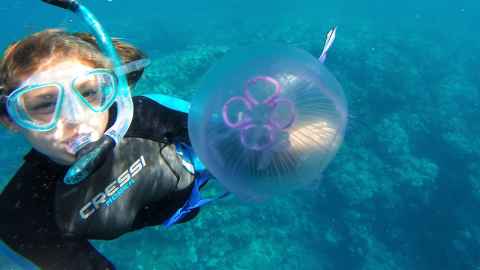Programme overview
Learn about cross-disciplinary approaches to marine science, and develop your practical skills in research design, environmental management and field techniques.
Programme structure
The MMarineSt is an 18 month, 180-point programme. Students choose Option 1 or 2 and may begin their studies by enrolling in Semester One or Two for Option 1.
Option 1:
90 points of coursework (6 courses) and 90 point research thesis MARINE 794A/B.
Option 1A (for students starting in Semester One)
Semester One (year one)
and two courses from:
- BIOSCI 724 - Marine Ecology
- BIOSCI 725 - Ecological Physiology
- BIOSCI 738 - Advanced Biological Data Analysis
- BIOSCI 739 - Dialogues in Biology
- ENVSCI 714 - Environmental Pollution
- FOODSCI 703 - Food Processing
- ENVMGT 742 - Social Dimensions of Global Environment Change
Semester Two (year one)
- BIOSCI 727 - Aquaculture
- MARINE 707 Applied Estuarine Ecology
- MARINE 794A - Thesis in Marine Studies
Final semester
- MARINE 794B Thesis in Marine Studies
Option 1B (for students starting in Semester Two)
Semester Two (year one)
and two courses from
- BIOSCI 729 - Evolutionary Biology
- BIOSCI 749 - Ecology of Microbial Interactions
- FOODSCI 708 - Advanced Food Science
- ENVMGT 744 - Resource Management
- EARTHSCI 720 - Geochemistry of Our World
Semester One (year two)
- MARINE 701 - Current Issues in Marine Science and
- MARINE 702 - Field Techniques in Marine Science
- MARINE 794A - Thesis in Marine Studies
Final semester
- MARINE 794B - Thesis in Marine Studies
Option 2
120 points of coursework (8 courses) and 60 point dissertation MARINE 792.
Semester One
and two courses from:
- BIOSCI 724 - Marine Ecology
- BIOSCI 725 - Ecological Physiology
- BIOSCI 738 - Advanced Biological Data Analysis
- BIOSCI 739 - Dialogues in Biology
- ENVSCI 714 - Environmental Pollution
- FOODSCI 703 - Food Processing
- ENVMGT 742 - Social Dimensions of Global Environment Change
Semester Two
and two courses from
- BIOSCI 729 - Evolutionary Biology
- BIOSCI 749 - Ecology of Microbial Interactions
- ENVMGT 744 - Resource Management
- FOODSCI 708 - Advanced Food Science
- EARTHSCI 720 - Geochemistry of Our World
Final semester
- MARINE 792 - Dissertation
You'll also need to meet other requirements, including time limits and total points limits. See Postgraduate enrolment.
2025 entry requirements
My highest qualification is from:
Programme requirements
Minimum programme requirements
Minimum requirements listed here are the likely grades required and do not guarantee entry. We assess each application individually and applicants may require a higher grade to be offered a place.
-
Study optionTaught 180 pointsGrade requiredGPA Grade Point Average 5.0
Bachelor of Science
-
Study optionResearch 180 pointsGrade requiredGPA Grade Point Average 5.0
Bachelor of Science
Further programme requirements
Select your study option:
You must have completed a BSc with a GPA of 5.0 in 60 points above Stage II.
Or, alternatively, have completd a Bachelors degree in a relevant major or specialisation, and have passed 60 points towards the Postgraduate Diploma in Science with a GPA of 4.0 in a relevant specialisation (provided the postgraduate diploma has not been awarded).
In exceptional circumstances, these requirements may be waived by the Associate Dean Academic, or nominee, if it is determined that you have at least three years of relevant practical, professional or scholarly experience.
You must have completed a BSc with a GPA of 5.0 in 60 points above Stage II.
Or, alternatively, have completd a Bachelors degree in a relevant major or specialisation, and have passed 60 points towards the Postgraduate Diploma in Science with a GPA of 4.0 in a relevant specialisation (provided the postgraduate diploma has not been awarded).
In exceptional circumstances, these requirements may be waived by the Associate Dean Academic, or nominee, if it is determined that you have at least three years of relevant practical, professional or scholarly experience.
Programme requirements
Minimum programme requirements
Minimum requirements listed here are the likely grades required and do not guarantee entry. We assess each application individually and applicants may require a higher grade to be offered a place.
-
Study optionTaught 180 pointsGrade requiredGPE Grade Point Equivalent 5.0
An undergraduate degree in science
-
Study optionResearch 180 pointsGrade requiredGPE Grade Point Equivalent 5.0
An undergraduate degree in science
-
QualificationIELTS Academic International English Language Testing SystemScore required6.5
No bands less than 6.0
Further programme requirements
Select your study option:
You must have completed an undergraduate degree in science with a GPE of 5.0. Your study must have been in marine-related subjects and at a recognised university (or similar institution).
You must have completed an undergraduate degree in science with a GPE of 5.0. Your study must have been in marine-related subjects and at a recognised university (or similar institution).
How much does a Master of Marine Studies cost per year?
2025 fees
- Domestic students
- NZ$10,018.80 – $10,892.40*
- International students
- NZ$52,842*
Fees are set in advance of each calendar year and will be updated on this website. Fees are inclusive of 15% GST, but do not include the Student Services Fee, course books, travel and health insurance, or living costs. Amounts shown are indicative only. In addition to the tuition fees, there is a Student Services Fee of $9.24 per point, estimated at $1,108.80 for full-time study (120 points). Fees will be confirmed upon completion of enrolment into courses.
*Please note: amounts shown are indicative and estimates only.
Find out about financial support information
Scholarships and awards
Find out about the scholarships you may be eligible for.
Student loans and allowances
Are you a New Zealand citizen or resident? You could be eligible for a student loan or allowance.
Cost of living
Get an idea of how much accommodation and general living in Auckland will cost.
Key dates
Please note: We will consider late applications if places are still available. International students should start the application process as early as possible to allow sufficient time to apply for a visa.
Application closing dates
- Semester One 2025
- 8 December 2024
- Semester Two 2025
- 4 July 2025
Start dates
Here are the start dates for the programme.
| Semester One | Starts – 3 March |
|---|---|
| Ends – 30 June | |
| Semester Two | Starts – 21 July |
| Ends – 17 November |
| Semester One | Starts – 2 March |
|---|---|
| Ends – 29 June | |
| Semester Two | Starts – 20 July |
| Ends – 16 November |
Other important dates
See important dates for the academic year, including orientation, enrolment, study breaks, exams, and graduation.
Where could this programme take you?
Graduates of the MMarineSt programme can look forward to employment opportunities in a wide variety of careers based in government agencies, research institutes and industry.
Jobs related to this programme
- Aquaculture technician
- Conservation ranger
- Environmental consultant
- Fishery analyst
- Marine biologist
- Marine technician
- Researcher

Using the Hauraki Gulf as her laboratory, Mallory is working towards her PhD in Marine Science. Postgraduate study helped her to combine her skills and make new connections.
Read MoreStudent career planning service
Once you become a student at the University, you can get help with planning and developing your career from Career Development and Employability Services.
Experience the University

Master of Marine Studies
Learn more about the programme from Marine Science Graduate Adviser Dr Alwyn Rees, Senior Lecturer in the Institute of Marine Science.
Do you need help?
Can’t find the answer in AskAuckland?
Need to speak to someone?
You can phone us directly.
- Auckland
- 923 5025
- Outside Auckland
- 0800 61 62 63
- International
- +64 9 373 7513
